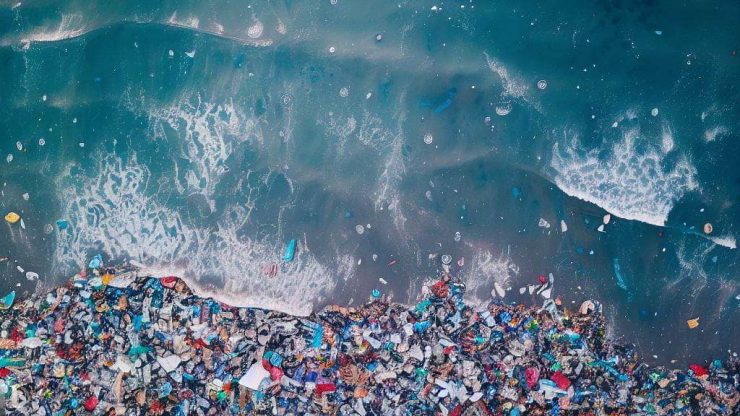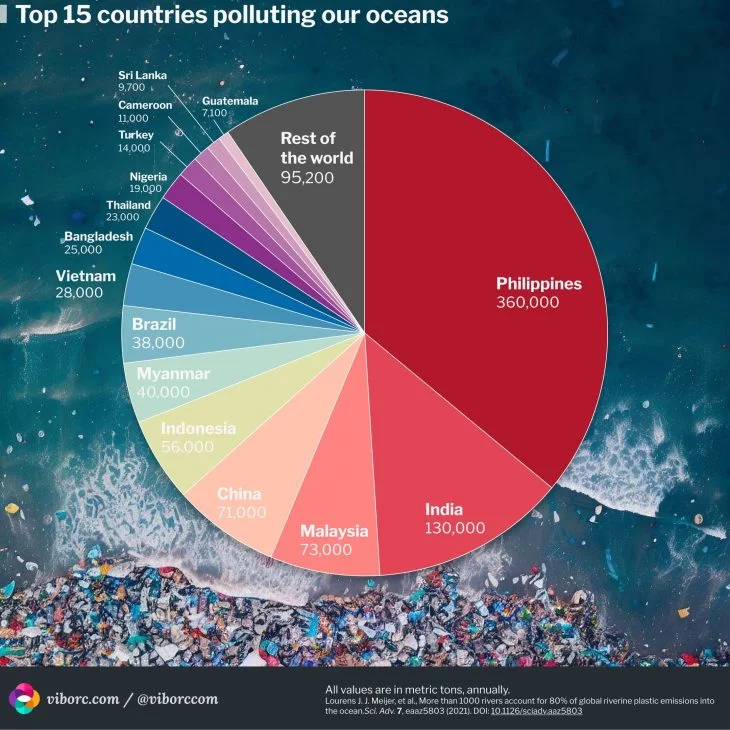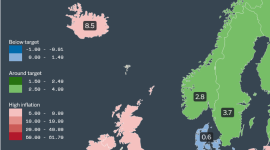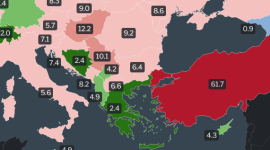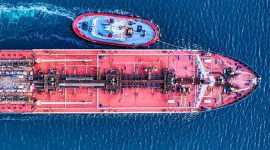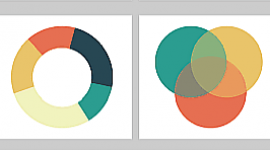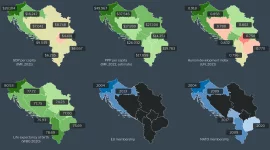In recent years, the detrimental effects of plastic pollution on our planet’s marine life and oceans have increasingly drawn attention worldwide. The oceans are vast, but they are not invincible. And plastic waste poses significant threats to aquatic life, ecosystems, and human health. This is a deep dive into the top countries polluting our oceans the most.
A breakthrough study published in Science Advances detailed the global scope of this problem. The research suggests that more than 1000 rivers account for a staggering 80% of global riverine plastic emissions into the ocean. Annually, these emissions range between 0.8 million and 2.7 million metric tons, with small urban rivers among the most polluting. This information is crucial for the development of focused mitigation strategies and technologies to reduce riverine plastic emissions.
The scale of the problem: Understanding mismanaged plastic waste (MPW)
With rapid urbanization and the associated expansion of plastic use, plastic waste management has become a challenge of global proportions. When waste management systems fail or are nonexistent, plastic waste becomes mismanaged and often ends up polluting the oceans. This issue is particularly evident in Asian countries like China and Indonesia. There, rapid economic growth, high population density, and underdeveloped waste management systems contribute significantly to plastic pollution.
Mismanaged plastic waste (MPW) refers to plastic waste that is not handled in an environmentally sound manner. If discarded inappropriately, this plastic waste eventually finds its way into our waterways.
As such, it is contributing to the plastic pollutants in the world’s oceans. The issue is compounded by poor waste management systems in some countries. That leads to significant amounts of plastic waste being leaked into the environment.
Top 20 countries contributing to ocean plastic waste
The aforementioned study provides a comprehensive list of countries with the highest plastic waste emissions into the oceans. The table displayed in the study reveals that the Philippines, India, and Malaysia are the top three contributors. China and Indonesia, countries that have long been associated with ocean plastic waste, also feature prominently on the list.
As the study mentions:
“For example, Malaysia generates more than 10 times less MPW than China (0.8 million MT per year in Malaysia against 12.8 million MT per year in China); however, the fraction of total plastic waste reaching the ocean is 9.0% for Malaysia and only 0.6% for China. The largest contributing country estimated by our model was the Philippines with 4820 rivers emitting 356,371 MT per year (8.8% of the total generated MPW in the country), followed by India with 126,513 MT per year (1.0% of total generated MPW through 1169 rivers), Malaysia with 73,098 MT per year through 1070 rivers, and China with 70,707 MT per year through 1309 rivers.”
The report also uncovers a noteworthy insight – it is not just the total plastic waste that matters, but also the effectiveness of waste management systems.
For instance, the United States, despite generating significant amounts of plastic waste, does not feature among the top countries contributing to ocean plastic waste. This is largely due to effective waste management systems that prevent most of its plastic waste from entering the ocean. For some other countries, it might be the fact that some of the more developed countries are exporting the plastic waste to poorer countries.
List of the Top 20 countries polluting our oceans the most
| COUNTRY | ANNUAL PLASTIC WASTE ENDING IN OCEANS (metric tons) |
TOTAL ANNUAL PLASTIC WASTE (metric tons) |
|---|---|---|
| World | 1,000,000 | 68,000,000 |
| Philippines | 360,000 | 4,000,000 |
| India | 130,000 | 13,000,000 |
| Malaysia | 73,000 | 810,000 |
| China | 71,000 | 12,000,000 |
| Indonesia | 56,000 | 820,000 |
| Myanmar | 40,000 | 990,000 |
| Brazil | 38,000 | 3,300,000 |
| Vietnam | 28,000 | 1,100,000 |
| Bangladesh | 25,000 | 1,000,000 |
| Thailand | 23,000 | 1,400,000 |
| Nigeria | 19,000 | 1,900,000 |
| Turkey | 14,000 | 1,700,000 |
| Cameroon | 11,000 | 580,000 |
| Sri Lanka | 9,700 | 160,000 |
| Guatemala | 7,100 | 310,000 |
| Haiti | 6,900 | 240,000 |
| Dominican R. | 6,300 | 190,000 |
| Venezuela | 6,000 | 670,000 |
| Tanzania | 5,800 | 1,700,000 |
| Algeria | 5,800 | 760,000 |
The rest world adds 64,500 metric tons of the plastic waste ending up in our oceans.
Chart of top 15 countries polluting our oceans
Anatomy of the problem: The role of rivers in plastic pollution
Rivers serve as major conduits for plastic waste from inland areas to the oceans. These rivers, often surrounded by high population densities, industrial activities, or inadequate waste management systems, can carry enormous amounts of plastic debris into the ocean.
The research suggests that the number of rivers contributing to ocean plastic waste is more widespread than previously thought. More than 1000 rivers around the world are significant contributors, making the problem more dispersed and complex. It is not just the major rivers in large, populous countries that are the culprits. Small urban rivers, especially in Southeast Asia and West Africa, are also significant contributors.
Towards solutions: Reducing plastic waste and improving waste management
A major takeaway from the study is the need for targeted strategies and technologies to reduce plastic waste and improve waste management. This begins with reducing our reliance on single-use plastics. While personal efforts to reduce plastic use are valuable, broad-based policy changes, including bans on single-use plastics, are needed to significantly curb plastic waste.
Countries also need to invest in better waste management systems. This includes improving waste collection infrastructure, promoting recycling, and implementing waste-to-energy solutions. Countries like Rwanda and Sweden provide valuable examples of what can be achieved with strong political will and investment in sustainable waste management.
For countries with rivers contributing significantly to plastic pollution, mitigation strategies should be directed towards these pollution hotspots. This could include river clean-up initiatives, the use of trash traps and booms, or the installation of advanced waste collection systems such as the ‘Mr. Trash Wheel’ in Baltimore, USA, which has successfully removed tons of debris from the waterway.
Another vital part of the solution lies in international cooperation. Plastic pollution knows no borders, so it requires a globally coordinated response. This includes funding and technical assistance for countries struggling with plastic pollution, sharing best practices, and creating global agreements to reduce plastic waste.
Public awareness and education
Educating the public about the impacts of plastic pollution and how to reduce plastic waste is another crucial element in combating this issue. Awareness campaigns can encourage people to make more sustainable choices, such as avoiding single-use plastics and participating in local clean-up activities. They can also pressure companies and governments to take more significant action to reduce plastic pollution.
The future of our oceans
Plastic pollution is a global problem that threatens the health of our oceans and marine life. Despite the scale of the issue, the evidence shows that the problem is not insurmountable. By reducing our reliance on single-use plastics, investing in better waste management systems, focusing efforts on pollution hotspots, and working together on a global scale, we can significantly reduce the amount of plastic entering our oceans.
However, to preserve our oceans for future generations, we need to act now. The clock is ticking, and every piece of plastic we keep out of our oceans is a step in the right direction. The future of our oceans is in our hands. It’s up to us to make a difference.
Here’s how you can support us
We hope you like our content. You can support us in several ways. If you use ad-blocking software, please consider adding us to a safelist. When sharing our content, please link back to the source. When sharing on Instagram, please tag @viborccom. The same is for Twitter (@viborccom).
Thanks! Hvala! Danke! Дякую!
ABOUT THE AUTHOR
